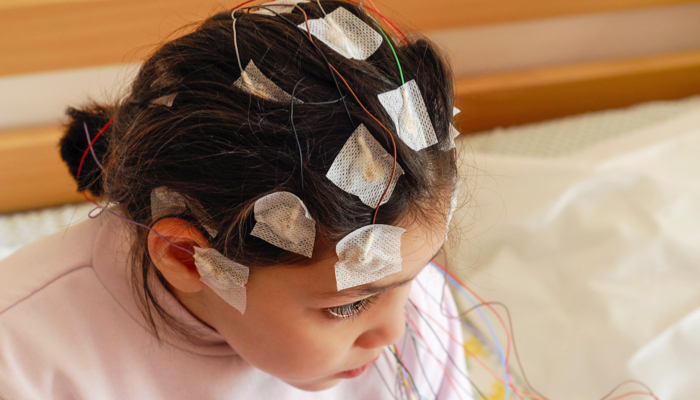5 Coping Strategies for Parents of Kids With Epilepsy

- When a child is diagnosed with epilepsy, it’s normal to feel scared, angry, and a range of other emotions.
- Find support from parents and professionals experienced with epilepsy.
- Reduce your stress by understanding your child’s epilepsy and the different types of seizures to create a safety plan.
- Help your child understand epilepsy in age-appropriate ways.
- Create a safe and supportive environment for your child to interact and do the same activities as other kids.
As a parent, we want to protect our children and give them the best life possible. From the moment they are born, we dream about their futures. So when a little child is diagnosed with epilepsy, it can feel like your dreams are shattering.
Witnessing a child having a seizure for the first time can feel terrifying. You may feel helpless, overwhelmed, or defeated. And when a child repeatedly has seizures, families report feeling on edge and anxious, waiting for another attack to occur at any moment. It can be unsettling.
Epilepsy, also called seizure disorder, is the most common childhood brain disorder in the United States. Epilepsy is a chronic illness affecting the nervous system and causing seizures. As a result, when a child has epilepsy, it significantly impacts the child and their family.
Coping with childhood epilepsy can be stressful, but focusing on coping strategies to support you and your family can positively impact your child’s well-being. Most children with epilepsy will have an active and rewarding life.
1. Seek Support From Healthcare Providers, Support Groups, and Other Parents

When a child is diagnosed with a medical condition such as epilepsy, it can be overwhelming emotionally and physically. To best care for your child, you must take care of yourself. The first step in coping with your child’s diagnosis of epilepsy is support. Seek support from the healthcare community. Find local epilepsy support groups and other parents to support you and your family.
Find a Healthcare Provider Experienced in Treating Epilepsy
If your child has experienced a seizure, they will likely be referred to a pediatric neurologist. A pediatric neurologist is a specialist that manages epilepsy. It is important to find a healthcare provider that specializes in treating epilepsy. The American Epilepsy Society can help you find an epilepsy specialist near you.
There are many types of seizures and epilepsy and many different treatment methods. Most children respond well to medication. A healthcare provider who specializes in treating children with epilepsy can best meet your child’s needs. Work together with your child’s doctor to find the best treatment options for your child’s specific needs.
Join a Support Group
Coping with epilepsy can feel isolating, scary, and so many other emotions. Support groups are available for parents and other family members. Joining a support group lets you share personal experiences with other families experiencing similar stress. These groups also allow you and your family to connect with other parents who have children with epilepsy in a local or virtual setting. Find the best one to fit you and your family’s needs:
- Parent to Parent USA: Empowers and supports parents of a child with special needs.
- Epilepsy Foundation: Provides local networks for parents of a child with epilepsy.
- Epilepsy Alliance America: Virtual and local support groups for children and parents.
Many parents who have a child with epilepsy experience fear and isolation that impacts family life. The feelings associated with medications, witnessing seizures, or considering brain surgery, are overwhelming. Connecting with other families to express feelings and fears regarding the impact of epilepsy can help.
Emotional Support
When your child was first diagnosed with epilepsy, you understandably experienced a range of emotions. From feeling guilty to anger and fear, all of your emotions associated with your child’s diagnosis are valid. Find time to express your emotions. Seek emotional support from others who have children with epilepsy or a professional. A mental health professional can be supportive in helping you not only process your emotions but also adjust to your family’s new normal.
2. Educate Yourself and Your Child’s Caregivers About Epilepsy and Its Management

Managing a chronic illness like epilepsy can involve taking medication, tracking seizures, and understanding triggers. Each child with epilepsy is unique. Educating yourself and your child’s caregivers about your child’s types of seizures and management is essential. You, your child, other caregivers, and family supports are all a part of your child’s management team. Everyone on the team can learn about the different types of epilepsy, seizure triggers, and your child’s treatment plan.
Understand the Different Types of Epilepsy and Seizure Triggers
Epilepsy is a brain disorder that causes recurring seizures. A child with epilepsy can have more than one type of seizure. Educating yourself, your child, and your child’s support team about the different types of seizures can help support your child’s treatment plan.
A child with epilepsy may have a seizure that lasts a few minutes, but if a seizure is longer than 5 minutes or a child has breathing problems, call 911. The Epilepsy Foundation describes the three types of seizures:
- General Onset: Affects both sides of the brain
- Focal Onset Seizures: Start in one area of the brain
- Unknown Onset Seizures: The beginning of the seizure is unknown or occurred when no one was around
When identifying the type of seizure, encourage caregivers to pay attention to the beginning, the child’s level of awareness, and whether movements happen during the seizure. Utilizing seizure monitors such as the SAMi seizure monitor can help you better track seizures and collect video images to share with your child’s treatment team. Tracking episodes with a seizure log can help your child’s doctor identify your child’s seizures.
In a seizure journal, document any factors that happened before. This detailed information can help you or your child’s other caregivers recognize warning signs when a seizure might occur. A journal will also allow you to notice any patterns in your child’s seizures, such as illness, periods of stress, missed medications, or a particular time of day.
Understand Your Child’s Medication and Treatment Plan
Parents are an important part of the child’s care team. Ask questions and collaborate with your child’s medical team to help make the best treatment plan for your child. Understand the medications your child is taking and the medication side effects.
Find out if the medication requires blood tests or what to do if your child misses a dose. Create routines to remember to take them as prescribed and develop a system to manage your child’s medications. If you are concerned the medications are not working effectively, follow up with your child’s doctor.
Communicate With Your Child’s School and Other Caregivers
Your child’s school and other caregivers are also a part of your child’s support team. Make sure others in your child’s life are educated on your child’s epilepsy and needs. Share resources on understanding epilepsy and your child’s specific seizure triggers.
School personnel can be trained in epilepsy and seizure first aid so they can be prepared if seizures occur at school. The Epilepsy Foundation offers seizure first aid training and certification at no cost.
Basic seizure first aid includes the following three steps:
- Stay: Stay calm and with the child throughout the seizure until they are safe and aware.
- Safe: If the child has a warning trigger, try to help them to a safe place. If on the ground, give them something soft to rest their head on.
- Side: If possible, gently roll the child to their side.
Other kids in your child’s school may be unfamiliar with pediatric epilepsy. Spend time encouraging your child’s school to educate other children about epilepsy. Depending on your child’s age, other children can also be a support.
3. Develop a Seizure Action Plan

A seizure action plan is a written document that outlines the warning signs of a seizure and the steps to take if your child has a seizure. This document should be easily shareable and kept with you and your child’s support team at all times to help keep your child safe.
A seizure action plan can be specific for at home, school, and in public. It is a quick reference guide so anyone can assist with your child’s needs and indicate when emergency medical attention is needed.
Forms are available through the Epilepsy Foundation website to create action plans that best suit your child’s epilepsy and needs.
Review your child’s action plan regularly to ensure it is up to date with your child’s current treatment plan and seizure triggers. Share your action plan with your child’s medical team to get their feedback. Help your child feel empowered by reviewing the seizure action plan with them on a regular basis.
4. Create a Safe and Supportive Environment for Your Child

Most parents worry or feel anxious regarding their child’s epilepsy. Families fear seizures may occur when they are not there to assist. However, most children with epilepsy can safely interact and do lots of different activities with other children.
All children need physical activity and social interactions for their psychological well-being. To reduce social isolation and psychological and emotional problems, encourage socialization with friends and playdates. This will improve your child’s mental health. There are things you can do to help make your child’s life as normal as possible.
Minimize Potential Dangers
When organizing playdates and other socialization events, minimize potential dangers to ensure your child will have a safer interaction. Share your action plan with other parents, coaches, and other individuals responsible for your child’s care. Doing so will ensure they are aware of your child’s condition and how to be prepared. For example, some children have more seizures due to a lack of sleep. If attending a sleepover, ensure your child does not go to bed late and that those responsible for your child’s care understand why this is important.
Be mindful of environmental factors that might be more dangerous for children diagnosed with epilepsy. Children with epilepsy have a greater risk of drowning. Make sure your child has one-on-one supervision when around pools, bathing, or any other water. Teach others specific first aid techniques to use if a seizure occurs in the water.
Provide a Calm and Soothing Environment During and After Seizures
During seizures, parents can provide a calm and soothing environment for their children. If a child has a warning sign, try to move them to a safe location and have the child lie down on their side. Support the child’s head with a soft cushion and loosen any tight clothing. Stay calm throughout and after the seizure.
After seizures, encourage caregivers to provide relaxing activities as needed for the child. This may include meditation or slow and focused breathing activities. Reassure your child they are okay and stay with them until they are aware and calm.
Support Your Child’s Independence and Self-Esteem
It’s important to not let your child’s epilepsy interfere with their independence. Although scary, your child needs to experience childhood. It’s essential for children’s mental health to feel independent.
In addition, children with epilepsy might have lower self-esteem or negative feelings about themselves. This can affect your child’s mood and sometimes lead to behavioral or psychiatric disorders. Support your child and their mental health needs by connecting them with a mental health therapist or social worker. Sometimes a combination of cognitive therapy, talk therapy, and medications can help support your child. A mental health therapist can also help build skills to improve your child’s self-esteem.
5. Encourage Open Communication and Honesty With Your Child

When a child has epilepsy, they need to understand their condition and needs. Talk openly and honestly with your child about epilepsy. This will help strengthen your relationship and will empower your child. When faced with a new diagnosis or new challenges, most children will create a story to try and understand their illness. Families can support their children more by helping their children understand epilepsy and creating a safe place to communicate about epilepsy.
Create a Safe Space to Discuss Feelings and Experiences
Parents can help young children understand epilepsy by reading children’s books about epilepsy. Allow your child to ask questions and let your child lead the discussion. Most children feel calmer and safer when allowed to share their experiences and feelings.
Validate your child’s feelings instead of trying to reassure or fix them. It’s okay for your child to feel angry or scared about their epilepsy. If you’re unsure of how to discuss feelings and talk openly with your child, social workers can provide support.
After a seizure, allow your child time to talk about the experience. They might feel embarrassed or scared afterward. Your child might not be alert during a seizure but might receive feedback from others that witnessed the event. Parents and other family members can help a child process the feelings associated with the experience.
Encourage Open Communication About Epilepsy and Related Challenges
Families can improve a child’s well-being by having age-appropriate, open conversations about epilepsy. Children with epilepsy can be encouraged to ask questions during doctor appointments or when meeting with other specialists. This will enable children to understand their epilepsy better. Allow children the opportunity to discuss the challenges they are experiencing to help guide treatment.
Pay attention to your child’s mood and behaviors. A change in mood or behavior can be an indication when children are struggling. Children tend to act out negatively when they are having a hard time. Try to be compassionate and supportive when they are struggling.
Help Your Child Develop Self-Advocacy Skills
When meeting with your medical team, encourage your child to ask questions about their epilepsy. Allowing children to speak up to their doctor and other care providers empowers them to not only understand their epilepsy but also advocate for their needs.

The information WonderBaby provides is not intended to be, and does not constitute, medical or other health advice or diagnosis and should not be used as such. Always consult with a qualified medical professional about your specific circumstances.
Related Posts

Eye Conditions and Syndromes, Visual Impairment
Neuralink Announces Plans to Restore Sight to the Blind with Brain Chip
Elon Musk’s company Neuralink has announced plans to begin human trials of its new “Blindsight” brain chip by the end of 2025.

Special Needs
5 Spring Cleaning Tips for Families of Children with Disabilities
Spring cleaning is an opportunity to create a more accessible, organized, and supportive space for your child with disabilities. Declutter, deep clean, and refresh!

Visual Impairment
The Gift of Understanding: How a Young Child Helps His Blind Father Navigate Life
When a parent is blind, it’s natural for people to wonder how their sighted child will adapt. Will they struggle to understand their parent’s needs? Will they feel burdened by...